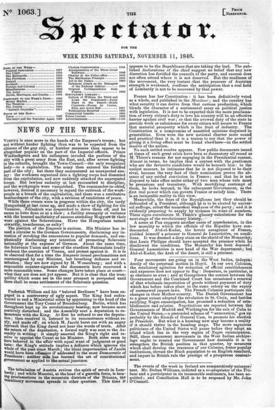France has her Constitution : it has been definitively voted
as a whole, and published in the Moniteur ; and the country has what security it can derive from that curious production, which blends the character of a sentimental essay on political justice with legislation. It is not to be expected that the mere proclama- tion of every citizen's duty to love his country will be an effective barrier against civil war ; or that the avowed duty of the state to provide work or subsistence for every citizen will secure to France that material prosperity which is the fruit of industry. The Constitution is a compromise of unsettled opinions disguised in generalities. Even were the new national charter more sound and practical than it is, it is a truism to say that the power of giving it a living effect must be found elsewhere—in the settled resolve of the nation.
No such settled resolve appears. Few public documents issued at times of such great crisis have been so damnatory all round as M. Thiers's reasons for not engaging in the Presidential contest. Almost in terms, he implies that a contest with the gentlemen who are the favourite candidates would be beneath him: in the coolest manner, he intimates that he is not disposed to be their rival, because the very fact of their nomination proves the ab- sence of any settled conviction in France ; and that he is not disposed to take office under either of two men whose rule must be precarious and transitory. With mortifying contempt of them, he looks beyond, to the subsequent Government, as the .first real power which can govern France or satisfy him. There is an inexorable reality in this view. Meanwhile, the fears of the Repubficans lest they should be defrauded of a President, although lit is to be elected by univer- sal suffrage, attest the numerical weakness of the party ; and it is evidently preparing to supply by violence its want of numbers. These signs corroborate M. Thiers's gloomy calculations for the next stage of the revolutionary history.
A scene at Pau suggests another cause of apprehension, in the low morality to which the officials of the Republic have con- descended. Abd-el-Kader, the heroic antagonist of France, yielded himself a prisoner to General de Lamoriciere, on condi- tions. It was deemed a deep stain on the shield of the Monarchy, that Louis Philippe should have accepted the prisoner while he disallowed the conditions. The Monarchy has been deposed ; General Lamoriciere is now head of the War department ; but Abd-el-Kader, the Arab of the desert, is still a prisoner.


























